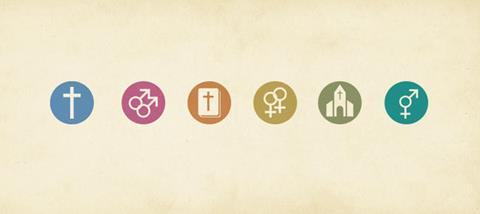
I lead a church and we have someone called Chris turning up who used to be a man, but has now had transgender surgery. Some of the members are upset and feel we should take a stand against this. They are worried about the example being set to our children, and that we are compromising our beliefs with regard to sexuality and becoming no different from the world. How do I lead the church through this one - not something I was prepared for by Bible college!
The Christian life handled maturely requires at its heart the ability to hold together paradox: two apparently conflicting truths about the same situation. Reverence and intimacy. Justice and grace.
Christian sexual ethics requires teaching God’s ideals held paradoxically with working within a fallen world – we have all sinned and fall short (Romans 3:23). The gospel is for all, and Jesus takes us from wherever we are at, to work good from there (Romans 8:28) and bring as much redemption as possible; complete perfection is not possible this side of the new heaven and earth. We therefore teach that transgender surgery is not God’s ideal (nor is a sexless or passionless marriage for that matter) and the transgender person has as much right and need for all that church has to offer as the next person.
At a personal level, a transgender person will have gone through the profoundest identity crisis and needs love and humanity more than anyone. We should also appreciate that once surgery and hormone treatment are complete, this is irreversible and therefore we cannot ask them to ‘repent’ or be any different. We can only build forward from where we are. (If Chris were at an earlier stage of considering surgery, then our approach would be more complex.) Demonstrate leadership by helping your church see the person within Chris; the heart within Chris that is risking reaching out by even attending your church.
At a group level, it is healthy to set boundaries in every group, creating security for all. You may benefit from writing a children’s worker policy that articulates a person specification for the role, to include the essence of 1 Timothy 4:12. This could define that while all people are welcome as members, there are particular functional roles that carry a requirement to uphold the values of the church.
At a psychological level, some people will need your help to work through the natural human reaction to unfamiliarity. If there is something we have not seen before, our eye gets drawn towards over-looking at it, as the brain is trying to comprehend and create a template of understanding. If you have ever travelled to a country where they have not seen your skin type before, you will have experienced the crowds of people wanting to touch your skin, hair, and comment on your height and build. Why? Because they have never computed this sort of human species before, and are trying to create a new brain template to contain who you are, so that they can then work out how to relate to you. Let’s strip this of emotive judgementalism and allow it to be what it is – a simple eye-brain catch-up process to create a template for something hereto not encountered.
Know your people and think through how to provide leadership through these processes. It may help them to understand some of the medical, psychological, financial and social aspects of going through gender reassignment. It may help them to appreciate and gain respect for the price this person has paid to get to this point. The aim of this is nothing to do with a 2D world of ‘right and wrong’. Rather an engagement with an alive and kicking world with a fallen starting point that is reaching out for as much redemption as is divinely possible this side of the new-heaven.
If you can provide leadership that takes your church community into paradoxical faith and loving, I believe you will all be enriched, and you may be surprised that Chris opens a door for many others to find their place in your church. This approach is nothing like that of secular society, which is often a compartmentalised mix of desert and shallow oasis for transgender people.
For me, I have always found that to love another person is to see the face of God. That’s the selfish paradox.



























